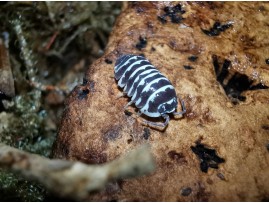
Why isopods ?
25/10/2023 | Zoomed Laboratories Inc.
Isopods play an important role in many tropical and temperate ecosystems by helping with the decomposition of plants, for example. One of the most important aspects of a bioactive setup is microfauna, small insects (sometimes called 'clean up crew') that help break down waste into a form more easily processed by plants and fungi.
Contrary to what many people think isopod are not insects. They are actually crustaceans, meaning they are more closely related to shrimp, crabs, and crayfish than to the ants and other insects that inhabit the same soil.
Isopods contribute to several important points:
Aerate the soil: As they move, woodlice will dig small tunnels and create voids in the soil, allowing air to descend lower into the substrate layer. These voids facilitate plant growth and prevent your substrate from becoming waterlogged.
Consuming waste: isopod will eat faeces, decaying plant matter, wood, and deceased feeding insects that your pet may have missed. They will help quickly break down harmful waste into less harmful products that plants can use. These crustaceans make nutrients more available to plants and fungi and not only do the isopods break down waste into more usable nutrient types, but they disperse these nutrients throughout the substrate as they dig and move around the vivarium. Plants and fungi can then break them down further, keeping your habitat healthier.
Fertilize plants: What goes in must come out. Fortunately, isopod droppings are excellent for stimulating healthy plant growth.
Eat mites and pest eggs: isopod will prey on occasional pest eggs. They won't touch reptile or amphibian eggs, but small eggs (like those of mites) are good game. They will help reduce the number of parasites in your bioactive enclosure.
Act as a supplemental food source: Many animals, especially dart frog and small lizards, will consume woodlice. With all the benefits that isopod bring to the bioactive terrarium, this may seem like a bad thing, but an occasional nibbling usually has little impact on the isopod population as a whole.
